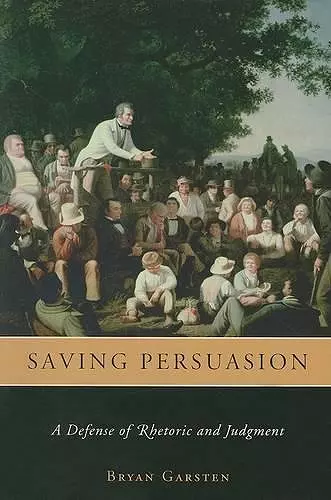Saving Persuasion
A Defense of Rhetoric and Judgment
Format:Paperback
Publisher:Harvard University Press
Published:30th Apr '09
Currently unavailable, and unfortunately no date known when it will be back

This book is a gem: learned, important, original, persuasive. While the trend in democratic theory is to sideline rhetoric in favor of rationalistic 'deliberation,' Garsten explores and defends an older tradition of republican rhetoric that disavows manipulation and pandering but differs with contemporary rationalism in practicing respect for citizens' actual opinions and for the arts of appealing to them. The book's arguments are unexpected and bracing; its discussion of canonical thinkers is consistently fresh and brings to bear neglected works to enliven more familiar debates. Finally, the work's style--vivid, clear, and elegant--deserves almost as much praise as its substance. -- Andrew Sabl, University of California, Los Angeles By attending in careful and original ways to how the attitudes of modern thinkers to classical rhetoric, and their anxieties about it, shaped their political theories, Bryan Garsten offers persuasive and novel answers to some perennially perplexing interpretive questions associated with these thinkers. In its nuanced treatments of Hobbes, Rousseau, and Kant, and also Cicero and Aristotle, both in their own right and with a view to revitalizing the art of rhetoric, Saving Persuasion contributes substantially to the scholarly literatures on each thinker and advances the field of political theory more generally. -- Jill Frank, University of South Carolina Bryan Garsten has a coherent and illuminating argument to offer, and has written a book packed with acute insights about great texts in the history of political thought. It's an intellectually ambitious book that will speak to scholars with interests spanning the whole discipline of political theory, and will allow each of its readers to see perennial issues of political philosophy in a new light. -- Ronald Beiner, University of Toronto
In Saving Persuasion, Bryan Garsten uncovers the early modern origins of today’s suspicious attitude toward rhetoric and seeks to loosen its grip on contemporary political theory. He argues that the artful practice of persuasion ought to be viewed as a crucial part of democratic politics.In today's increasingly polarized political landscape it seems that fewer and fewer citizens hold out hope of persuading one another. Even among those who have not given up on persuasion, few will admit to practicing the art of persuasion known as rhetoric. To describe political speech as "rhetoric" today is to accuse it of being superficial or manipulative. In Saving Persuasion, Bryan Garsten uncovers the early modern origins of this suspicious attitude toward rhetoric and seeks to loosen its grip on contemporary political theory. Revealing how deeply concerns about rhetorical speech shaped both ancient and modern political thought, he argues that the artful practice of persuasion ought to be viewed as a crucial part of democratic politics. He provocatively suggests that the aspects of rhetoric that seem most dangerous--the appeals to emotion, religious values, and the concrete commitments and identities of particular communities--are also those which can draw out citizens' capacity for good judgment. Against theorists who advocate a rationalized ideal of deliberation aimed at consensus, Garsten argues that a controversial politics of partiality and passion can produce a more engaged and more deliberative kind of democratic discourse.
This book is a gem: learned, important, original, persuasive. While the trend in democratic theory is to sideline rhetoric in favor of rationalistic 'deliberation,' Garsten explores and defends an older tradition of republican rhetoric that disavows manipulation and pandering but differs with contemporary rationalism in practicing respect for citizens' actual opinions and for the arts of appealing to them. The book's arguments are unexpected and bracing; its discussion of canonical thinkers is consistently fresh and brings to bear neglected works to enliven more familiar debates. Finally, the work's style--vivid, clear, and elegant--deserves almost as much praise as its substance. -- Andrew Sabl, University of California, Los Angeles
By attending in careful and original ways to how the attitudes of modern thinkers to classical rhetoric, and their anxieties about it, shaped their political theories, Bryan Garsten offers persuasive and novel answers to some perennially perplexing interpretive questions associated with these thinkers. In its nuanced treatments of Hobbes, Rousseau, and Kant, and also Cicero and Aristotle, both in their own right and with a view to revitalizing the art of rhetoric, Saving Persuasion contributes substantially to the scholarly literatures on each thinker and advances the field of political theory more generally. -- Jill Frank, University of South Carolina
Bryan Garsten has a coherent and illuminating argument to offer, and has written a book packed with acute insights about great texts in the history of political thought. It's an intellectually ambitious book that will speak to scholars with interests spanning the whole discipline of political theory, and will allow each of its readers to see perennial issues of political philosophy in a new light. -- Ronald Beiner, University of Toronto
Bryan Garsten's fascinating book Saving Persuasion: A Defense of Judgment and Rhetoric explores the long traditions of attacking, or defending, rhetoric and its place in human life. -- Simon Blackburn * Financial Times *
An engaging and original work of wide appeal. Garsten analyzes the formation of an antirhetorical tradition in modern political thought, investigates its rival classical tradition of rhetoric and judgment, and explores the promise that a politics of persuasion offers contemporary democratic societies. -- Daniel Kapust * Perspectives on Politics *
Saving Persuasion deserves a wide audience. Any future discussion of the fate of rhetoric in the early modern period, of Cicero, and of Aristotle’s Rhetoric will be defined by Garsten’s work. And we rhetoricians can be very grateful to Garsten for joining us in our often quixotic quest to “save persuasion.” -- James Arnt Aune * Philosophy and Rhetoric *
- Nominated for Foundations of Political Theory First Book Award 2007
- Nominated for David and Elaine Spitz Prize 2008
ISBN: 9780674032293
Dimensions: 235mm x 156mm x 19mm
Weight: 431g
290 pages